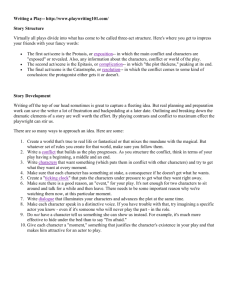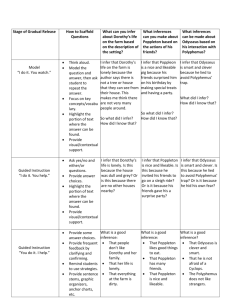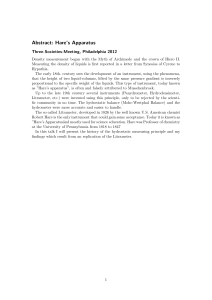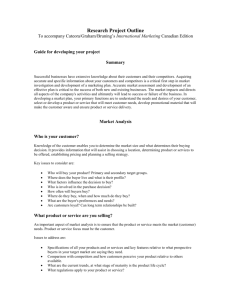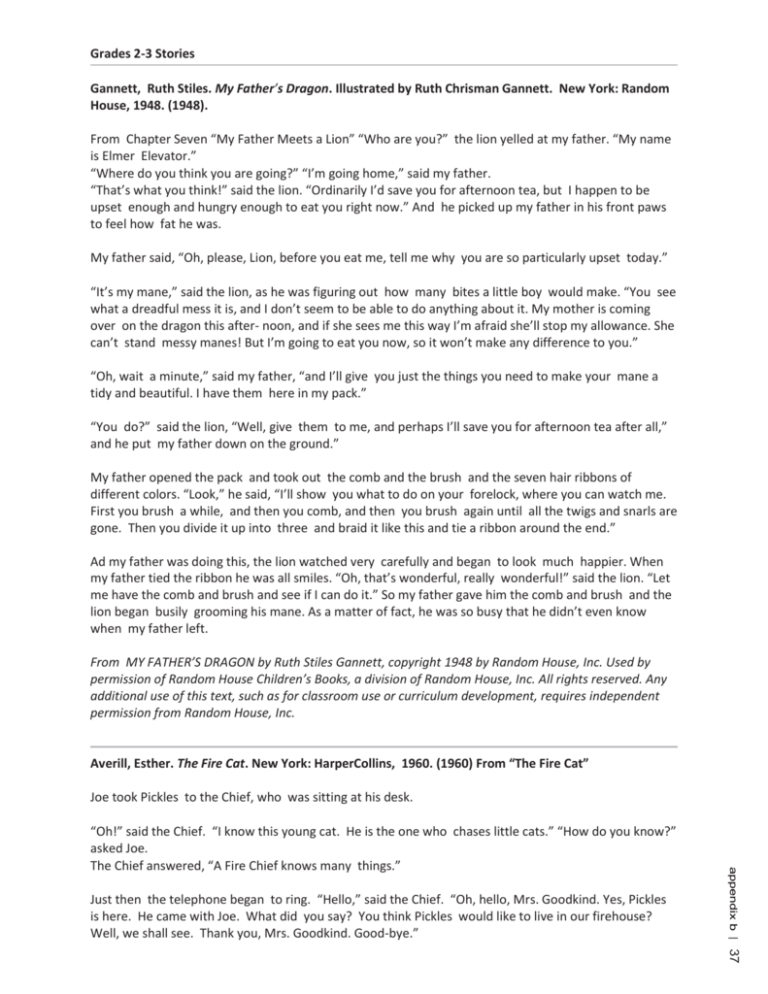
Grades 2-3 Stories
Gannett, Ruth Stiles. My Father’s Dragon. Illustrated by Ruth Chrisman Gannett. New York: Random
House, 1948. (1948).
From Chapter Seven “My Father Meets a Lion” “Who are you?” the lion yelled at my father. “My name
is Elmer Elevator.”
“Where do you think you are going?” “I’m going home,” said my father.
“That’s what you think!” said the lion. “Ordinarily I’d save you for afternoon tea, but I happen to be
upset enough and hungry enough to eat you right now.” And he picked up my father in his front paws
to feel how fat he was.
My father said, “Oh, please, Lion, before you eat me, tell me why you are so particularly upset today.”
“It’s my mane,” said the lion, as he was figuring out how many bites a little boy would make. “You see
what a dreadful mess it is, and I don’t seem to be able to do anything about it. My mother is coming
over on the dragon this after- noon, and if she sees me this way I’m afraid she’ll stop my allowance. She
can’t stand messy manes! But I’m going to eat you now, so it won’t make any difference to you.”
“Oh, wait a minute,” said my father, “and I’ll give you just the things you need to make your mane a
tidy and beautiful. I have them here in my pack.”
“You do?” said the lion, “Well, give them to me, and perhaps I’ll save you for afternoon tea after all,”
and he put my father down on the ground.”
My father opened the pack and took out the comb and the brush and the seven hair ribbons of
different colors. “Look,” he said, “I’ll show you what to do on your forelock, where you can watch me.
First you brush a while, and then you comb, and then you brush again until all the twigs and snarls are
gone. Then you divide it up into three and braid it like this and tie a ribbon around the end.”
Ad my father was doing this, the lion watched very carefully and began to look much happier. When
my father tied the ribbon he was all smiles. “Oh, that’s wonderful, really wonderful!” said the lion. “Let
me have the comb and brush and see if I can do it.” So my father gave him the comb and brush and the
lion began busily grooming his mane. As a matter of fact, he was so busy that he didn’t even know
when my father left.
From MY FATHER’S DRAGON by Ruth Stiles Gannett, copyright 1948 by Random House, Inc. Used by
permission of Random House Children’s Books, a division of Random House, Inc. All rights reserved. Any
additional use of this text, such as for classroom use or curriculum development, requires independent
permission from Random House, Inc.
Averill, Esther. The Fire Cat. New York: HarperCollins, 1960. (1960) From “The Fire Cat”
Joe took Pickles to the Chief, who was sitting at his desk.
Just then the telephone began to ring. “Hello,” said the Chief. “Oh, hello, Mrs. Goodkind. Yes, Pickles
is here. He came with Joe. What did you say? You think Pickles would like to live in our firehouse?
Well, we shall see. Thank you, Mrs. Goodkind. Good-bye.”
appendix b |
“Oh!” said the Chief. “I know this young cat. He is the one who chases little cats.” “How do you know?”
asked Joe.
The Chief answered, “A Fire Chief knows many things.”
37
The Chief looked at Pickles and said, “Mrs. Goodkind says you are not a bad cat. And Joe likes you. I
will let you live here IF you will learn to be a good firehouse cat.”
Pickles walked quietly up the stairs after Joe. Joe and Pickles went into a room where the firemen
lived.
The men were pleased to have a cat. They wanted to play with Pickles. But suddenly the fire bell rang.
All the fire- men ran to a big pole and down they went. The pole was the fast way to get to their
trucks. Pickles could hear the trucks start up and rush off to the fire.
Pickles said to himself, “I must learn to do what the firemen do, I must learn to slide down the pole.” He
jumped and put his paws around the pole. Down he fell with a BUMP.
“Bumps or no bumps, I must try again,” said Pickles. Up the stairs he ran. Down the pole he came –
and bumped. But by the time the firemen came back from the fire, Pickles could slide down the pole.
“What a wonderful cat you are!” said the firemen. The Chief did not say anything.
Pickles said to himself, “I must keep learning everything I can.” So he learned to jump up on one of the
big trucks. And he learned to sit up straight on the seat while the truck raced to a fire.
“What a wonderful cat you are!” said the firemen. The Chief did not say anything. Pickles said to
himself, “Now I must learn to help the firemen with their work.”
At the next fire, he jumped down from the truck. He ran to a big hose, put his paws around it, and
tried to help a fire- man shoot water at the flames.
“What a wonderful cat you are!” said the firemen. The Chief did not say anything.
The next day the Chief called all the firemen to his desk. Then he called for Pickles. Pickles did not
know what was going to happen. He said to himself, “Maybe the Chief does not like the way I work.
Maybe he wants to send me back to my old yard.” But Pickles went to the Chief.
At the Chief’s desk stood all the firemen – and Mrs. Goodkind! The Chief said to Pickles, “I have asked
Mrs. Goodkind to come because she was your first friend. Pickles, jump up on my desk. I have
something to say to you.”
Pickles jumped up on the desk and looked at the Chief. Out of the desk the Chief took – a little fire hat!
“Pickles,” said the Chief, “I have watched you at your work. You have worked hard. The time has
come for you to know that you are now our Fire Cat.”
And with these words, the Chief put the little hat on Pickles’ head.
COPYRIGHT © 1960 BY ESTHER AVERILL. Copyright © renewed 1988. Used by permission of
HarperCollins Publishers.
Steig, William. Amos & Boris. New York: Farrar, Straus and Giroux, 1971. (1971) Shulevitz, Uri. The
Treasure. New York: Farrar, Straus and Giroux, 1978. (1978) Cameron, Ann. The Stories Julian Tells.
New York: Random House, 1981. (1981) MacLachlan, Patricia. Sarah, Plain and Tall. New York:
HarperCollins, 1985. (1985)
From Chapter I
“Did Mama sing every day?” asked Caleb. “Every-single-day?” He sat close to the fire, his chin in his
hand. It was dusk, and the dogs lay beside him on the warm hearthstones.
“Every-single-day,” I told him for the second time this week. For the twentieth time this month. The
hundredth time this year? And the past few years?
“And did Papa sing, too?”
“Yes. Papa sang, too. Don’t get so close, Caleb. You’ll heat up.”
He pushed his chair back. It made a hollow scraping sound on the hearthstones. And the dogs stirred.
Lottie, small and black, wagged her tail and lifted her head. Nick slept on.
I turned the bread dough over and over on the marble slab on the kitchen table.
“Well, Papa doesn’t sing anymore,” said Caleb very softly. A log broke apart and crackled in the
fireplace. He looked up at me. “What did I look like when I was born?”
“You didn’t have any clothes on,” I told him. “I know that,” he said.
“You looked like this.” I held the bread dough up in a round pale ball. “I had hair,” said Caleb seriously.
“Not enough to talk about,” I said.
“And she named me Caleb,” he went on, filling in the old familiar story. “I would have named you
Troublesome,” I said, making Caleb smile.
“And Mama handed me to you in the yellow blanket and said…” He waited for me to finish the story.
“And said…?” I sighed. “And Mama said. ‘Isn’t he beautiful, Anna?’”
“And I was,” Caleb finished.
Caleb thought the story was over, and I didn’t tell him what I had really thought. He was homely and
plain, and he had a terrible holler and a horrid smell. But these were not the worst of him. Mama died
the next morning. That was the worst thing about Caleb.
“Isn’t he beautiful, Anna?” her last words to me. I had gone to bed thinking how wretched he looked.
And I forgot to say good night.
I wiped my hands on my apron and went to the window. Outside, the prairie reached out and touched
the places where the sky came down. Though the winter was nearly over, there were patches of snow
everywhere. I looked at the long dirt road that crawled across the plains, remembering the morning
that Mama had died, cruel and sunny. They had come for her in a wagon and taken her away to be
buried. And then the cousins and aunts and uncles had come and tried to fill up the house. But they
couldn’t.
Slowly, one by one, they left. And then the days seemed long and dark like winter days, even though
it wasn’t winter. And Papa didn’t sing.
COPYRIGHT © 1985 BY PATRICIA MACLACHLAN. Used by permission of HarperCollins Publishers.
Rylant, Cynthia. Henry and Mudge: The First Book of Their Adventures. Illustrated by Suçie Stevenson.
New York: Atheneum, 1996. (1987)
From “Henry and Mudge”
Every day when Henry woke up, he saw Mudge’s big head. And every day when Mudge woke up,
he saw Henry’s small face.
They ate breakfast at the same time; they ate supper at the same time.
And when Henry was at school, Mudge just lay around and waited. Mudge never went for a walk
without Henry again. And Henry never worried that Mudge would leave.
Because sometimes, in their dreams, they saw long silent roads, big wide fields, deep streams, and
pine trees.
In those dreams, Mudge was alone and Henry was alone. So when Mudge woke up and knew Henry
was with him, he remembered the dream and stayed closer.
And when Henry woke up and knew Mudge was with him, he remembered the dream and the
looking
and the calling
and the fear
and he knew he would never lose Mudge again.
Reprinted with the permission of Atheneum Books for Young Readers, an imprint of Simon & Schuster
Children’s Pub- lishing Division from HENRY AND MUDGE: The First Book by Cynthia Rylant. Text
copyright © 1987 Cynthia Rylant.
Stevens, Janet. Tops and Bottoms. New York: Harcourt, 1985. (1995)
Once upon a time there lived a very lazy bear who had lots of money and lots of land. His father had
been a hard worker and a smart business bear, and he had given all of his wealth to his son.
But all Bear wanted to do was sleep.
Not far down the road lived a hare. Although Hare was clever, he sometimes got into trouble. He had
once owned
land, too, but now he had nothing. He had lost a risky bet with a tortoise and had sold off all of his
land to Bear to pay off the debt.
Hare and his family were in very bad shape.
“The children are so hungry Father Hare! We must think of something!” Mrs. Hare cried one day. So
Hare and Mrs. Hare put their heads together and cooked up a plan.
[…]
Bear stared at his pile. “But, Hare, all the best parts are in your half!” “You chose the tops, Bear,”
Hare said.
“Now, Hare, you’ve tricked me. You plant this field again—and this season I want the bottoms!” Hare
agreed. “It’s a done deal, Bear.”
LaMarche, Jim. The Raft. New York: HarperCollins, 2000. (2000)
Somehow, on the river, it seemed like summer would never end. But of course it did.
On my last day, I got up extra early and crept down to the dock. The air was cool and a low pearly fog
hung over the river. I untied the raft and quietly drifted downstream.
Ahead of me, through the fog, I saw two deer moving across the river, a doe and a fawn. When they
reached the shore, the doe leaped easily up the steep bank, then turned to wait for her baby. But the
fawn was in trouble. It kept slipping down the muddy bank, The doe returned to the water to help, but
the more the fawn struggled, the deeper it got stuck in the mud.
I pushed off the river bottom and drove the raft hard onto the muddy bank, startling the doe. Then I
dropped into the water. I was ankle-deep in mud.
You’re okay,” I whispered to the fawn, praying that the raft would calm it. “I won’t hurt you.”
Gradually the fawn stopped struggling, as if it understood that I was there to help. I put my arms
around it and pulled. It barely moved. I pulled again, then again. Slowly the fawn eased out of the mud,
and finally it was free. Carefully I carried the fawn up the bank to its mother.
Then, quietly, I returned to the raft. From there I watched the doe nuzzle and clean her baby, and I
knew what I had
to do. I pulled the stub of a crayon from my pocket, and drew the fawn, in all its wildness, onto the old
gray boards of the raft. When I had finished, I knew it was just right.
Text copyright © 2000 Jim LaMarche. Used by permission of HarperCollins Publishers.
Rylant, Cynthia. Poppleton in Winter. Illustrated by Mark Teague. New York: Scholastic, 2001. (2001)
From “The Sleigh Ride”
It was a very snowy day and Poppleton felt like a sleigh ride. He called his friend Cherry Sue. “Would
you like to go for a sleigh ride?” Poppleton asked.
“Sorry, Poppleton, I’m making cookies,” said Cherry Sue.
Poppleton called his friend Hudson.
“Would you like to go for a sleigh ride?” Poppleton asked. “Sorry,” said Hudson, “I’m baking a cake.”
Poppleton called his friend Fillmore.
“Would you like to go for a sleigh ride?” Poppleton asked. “Sorry,” said Fillmore. “I’m stirring some
fudge.”
Poppleton was disappointed. He couldn’t find one friend for a sleigh ride. And besides that, they
were all making such good things to eat!
He sat in front of his window, feeling very sorry for himself. Suddenly the doorbell rang. “SURPRISE!”
There stood all of Poppleton’s friends! With cookies and cake and fudge and presents! “HAPPY
BIRTHDAY, POPPLE- TON!”
He had forgotten his own birthday! Everyone ate and laughed and played games with Poppleton.
Then, just before midnight, they all took him on a sleigh ride.
The moon was full and white. The stars twinkled. The owls hooted in the trees. Over the snow went
the sleigh filled with Poppleton and all of his friends.
Poppleton didn’t even make a birthday wish. He had everything already.
From POPPLETON IN WINTER by Cynthia Rylant. Scholastic Inc./Blue Sky Press. Copyright © 2001 by
Cynthia Rylant. Used by permission.
Rylant, Cynthia. The Lighthouse Family: The Storm. Illustrated by Preston McDaniels. New York: Simon
& Schuster,
2002. (2002)
In a lonely lighthouse, far from city and town, far from the comfort of friends, lived a kindhearted cat
named Pandora. She had been living in this lighthouse all alone for four long years, and it was beginning
to wear. She found herself
sighing long, deep, lonely sighs. She sat on the rocks overlooking the waves far too long. Sometimes
her nose got a sunburn.
And at night, when she tried to read by the lantern light, her mind wandered and she would think for
hours on her childhood when she had friends and company.
Why did Pandora accept this lonely lighthouse life? Because a lighthouse had once saved her.
Reprinted with the permission of Simon & Schuster Books for Young Readers, an imprint of Simon &
Schuster Chil- dren’s Publishing Division from THE LIGHTHOUSE FAMILY: THE STORM by Cynthia Rylant.
Text Copyright © 2002
Cynthia Rylant.
Osborne, Mary Pope. The One-Eyed Giant (Book One of Tales from the Odyssey). New York: Disney
Hyperion, 2002. (2002)
From Chapter Five: “The One-Eyed Giant”
A hideous giant lumbered into the clearing. He carried nearly half a forest’s worth of wood on his back.
His monstrous head jutted from his body like a shaggy mountain peak. A single eye bulged in the center
of his forehead.
The monster was Polyphemus. He was the most savage of all the Cyclopes, a race of fierce one-eyed
giants who lived without laws or leader. The Cyclopes were ruthless creatures who were known to
capture and devour any sailors who happened near their shores.
Polyphemus threw down his pile of wood. As it crashed to the ground, Odysseus and his men fled to the
darkest corners of the cave.
Unaware that the Greeks were hiding inside, Polyphemus drove his animals into the cave. Then he
rolled a huge boul- der over its mouth to block out the light of day and imprison his flock inside.
Twenty-four wagons could not haul that rock away, Odysseus thought desperately. How will we
escape this monster? Odysseus’ men trembled with terror as the giant made a small fire and milked his
goats in the shadowy light. His milking done, he threw more wood on his fire. The flame blazed brightly, lighting up the corners of the
cave where Odysseus and his men were hiding.
“What’s this? Who are you? From where do you come?” the giant boomed. He glared at the Greeks
with his single eye. “Are you pirates who steal the treasure of others?”
Odysseus’ men were frozen with terror. But Odysseus hid his own fear and stepped toward the
monster.
“We are not pirates,” he said, “We are Greeks blown off course by storm winds. Will you offer us the
gift of hospitality like a good host? If you do, mighty Zeus, king of the gods, will be pleased. Zeus is the
guardian of all strangers.”
“Fool!” the giant growled. “Who are you to tell me to please Zeus? I am a son of Poseidon, god of the
seas! I am not afraid of Zeus!”
Odysseus men cowered in fear.
Polyphemus moved closer to Odysseus. He spoke in a soft, terrible voice. “But tell me, stranger,
where is your ship? Near or far from shore?”
Odysseus knew Polyphemus was trying to trap him. “Our ship was destroyed in the storm,” he lied. “It
was dashed against the rocks. With these good men I escaped, I ask you again, will you welcome us?”
From Mary Pope Osborne’s the One Eyed Giant © 2002 by Mary Pope Osborne. Reprinted by permission
of
Disney∙Hyperion, an imprint of Disney Book Group LLC, All Rights Reserved.
Silverman, Erica. Cowgirl Kate and Cocoa. Illustrated by Betsy Lewin. Orlando: Harcourt, 2005. (2005)
From Chapter 1: “A Story for Cocoa”
Cowgirl Kate rode her horse, Cocoa, out to the pasture. “It’s time to herd cows,” said Cowgirl Kate.
“I am thirsty,” said Cocoa.
He stopped at the creek and took a drink. “Are you ready now?” asked Cowgirl Kate. “No,” said Cocoa.
“Now I am hungry.”
Cowgirl Kate gave him an apple. He ate it in one bite. Then he sniffed the saddlebag.
Cowgirl Kate gave him another apple. He ate that in one bite, too. He sniffed the saddlebag again. “You
are a pig,” said Cowgirl Kate.
“No,” said Cocoa. “I am a horse.” “A cowhorse?” she asked.
“Of course,” he said.
“But a cowhorse herds cows,” she said. “Just now, I am too full,” he said.
Cowgirl Kate smiled. “Then I will tell you a story.”
“Once there was a cowgirl who needed a cowhorse. She went to a ranch and saw lots and lots of
horses. Then she saw a horse whose coat was the color of chocolate. His tail and mane were the color
of caramel. ‘Yum,’ said the cow- girl, ‘you are the colors of my favorite candy.’ The horse looked at
her. He sniffed her.”
“’Are you a real cowgirl?’ he asked. ‘I am a cowgirl from the boots up,’ she said. ‘Well, I am a cowhorse
from the mane down,’ he said. ‘Will you work hard every day?’ the cowgirl asked.. The horse raised
his head high. ‘Of course,’ he
said, ‘a cowhorse always does his job.’ ‘At last,’ said the cowgirl, ‘I have found my horse.’”
“That was a good story,” said Cocoa. He raised his head high. “And now I am ready to herd cows.”
Excerpted from COWGIRL KATE AND COCOA By Erica Silverman. Text copyright © 2005 by Erica
Silverman. Used by
Permission of Houghton Mifflin Harcourt Publishing Company. All rights reserved.

